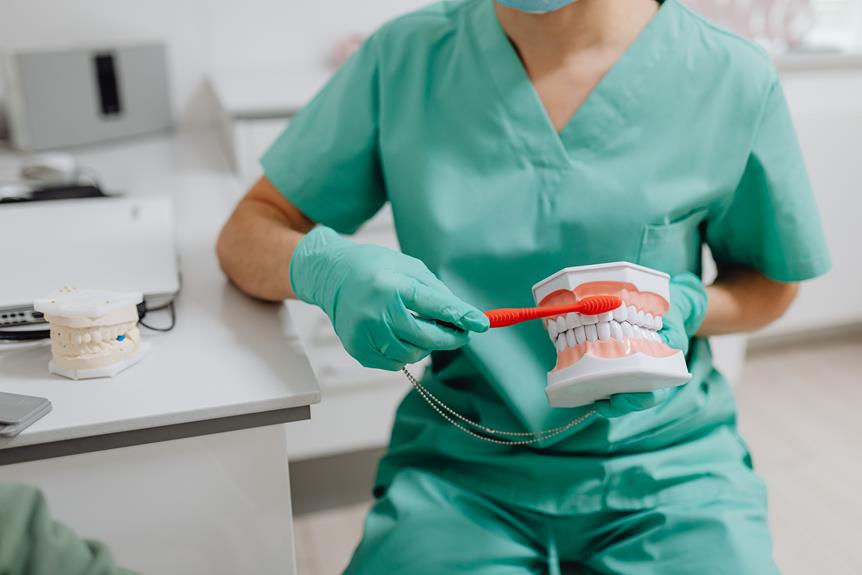You might think that brushing your teeth with salt would be a great way to clean and whiten your pearly whites, but you'd be wrong. Salt can actually do more harm than good to your dental health.
In this article, you'll learn why brushing your teeth with salt can be dangerous and the risks associated with this practice. Brace yourself: the truth might surprise you, but you'll be glad you know the facts and can take control of your oral health.
Dental Damage From Salt Brushing
Your teeth's enamel can be damaged if you brush them with salt. Salt brushing can cause tooth erosion, leading to painful sensitivity and bad breath. It can also increase your risk of cavities and gum disease.
Salt is an abrasive substance and can wear away your enamel, leaving it weakened and vulnerable to bacteria and acids in the mouth. Brushing your teeth with salt should be avoided, as it can cause more harm than good in terms of dental health.
Instead, opt for a fluoride toothpaste and regular dental check-ups to keep your teeth and gums healthy.
Impact of Salt on Enamel
Brushing with salt can weaken and damage your enamel, and can lead to further problems. Used as a bad breath remedy, salt can cause erosion, leading to exposed dentin and an increased risk of tooth decay. This could also result in an increased sensitivity to hot and cold food and drinks.
Oral health benefits can be enjoyed without the use of salt, so it's important to be mindful of the impact it can have on your teeth. Opt for toothpaste with fluoride and use a soft-bristled toothbrush to ensure your enamel stays healthy and strong.
Salt and Gingivitis
You and your gums can be at risk of gingivitis if you use salt to brush your teeth, so be sure to avoid it. Salt can aggravate gum sensitivity, promote gum irritation, and lead to infection.
To maintain a healthy mouth, brush with toothpaste and floss daily. Be mindful of any salt sensitivity and consult a dentist if symptoms worsen. Make sure to take preventive measures like regular dental check-ups and brush with soft bristles.
Taking control of your oral hygiene and being aware of salt sensitivity can help you maintain healthy gums and teeth.
The Effects of Salt on Dental Hygiene
Using salt to brush your teeth can have detrimental effects on your dental hygiene. While it may seem like a natural way to improve oral health, it can actually lead to gum disease.
Salt is abrasive and can strip away protective enamel and cause your gums to recede. It can also lead to irritation and inflammation of the gums, a dry mouth, and bad breath.
While a small amount of salt in your oral care routine can be beneficial, brushing with salt alone can be damaging to your oral health.
Risks of Using Salt in Oral Hygiene
If you choose to include salt in your oral hygiene routine, you should be aware of the potential risks involved. Salt can cause dehydration, changes in pH balance, and the reduction of beneficial bacteria.
It can also lead to tooth decay, gum disease, and other oral health issues. When used in moderation, salt can improve dental hygiene, but it's important to be mindful of the risks for optimal oral health.
Frequently Asked Questions
How Often Should I Brush My Teeth With Salt?
Brush your teeth with salt no more than once a week. Doing so can help promote oral hygiene and reduce tooth decay, while being gentle on your teeth. However, be sure to follow up with regular brushing with toothpaste and flossing for best results.
Are There Any Other Ingredients I Can Mix With Salt for Brushing My Teeth?
Mixing ratios of salt with other ingredients can help you keep your teeth healthy. Consider adding baking soda, an effective salt alternative, to your brushing routine. A teaspoon of baking soda and a pinch of salt can make a great combination to keep your teeth clean and free from damaging side effects.
What Are the Long-Term Effects of Brushing With Salt?
Brushing with salt can damage oral hygiene and lead to tooth decay over time. Take care to avoid long-term effects by using healthier alternatives to keep your mouth healthy and liberated.
Are There Any Natural Alternatives to Brushing With Salt?
"Eager to free yourself from the side effects of brushing with salt? Try natural alternatives such as baking soda and hydrogen peroxide – a 'fresh breath' elixir! Both are effective, safe, and gentle on teeth.
Is Brushing With Salt Safe for Children?
Brushing with salt can be safe for children, as long as it is done in moderation. It can help promote oral health and reduce tooth decay, but it should not be used as a replacement for regular brushing. If used as part of a regular dental routine, it can be beneficial to children's overall oral health.
Conclusion
Brushing your teeth with salt can have serious repercussions on your oral health. The abrasive nature of salt can wear away enamel, cause gingivitis, and lead to poor dental hygiene.
Ultimately, using salt as a toothbrush can be a recipe for disaster, leaving you with a smile that's anything but sweet. Don't risk it – take the time to brush properly with a toothbrush and toothpaste for a healthy, sparkling smile.






